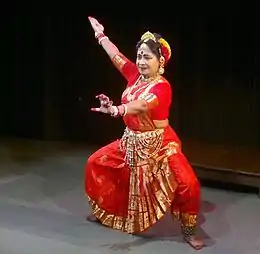Gaudiya Nritya
Gaudiya Nritya (Bengali: গৌড়ীয় নৃত্য, IAST: Gaur̤īẏa Nṛtya) or Gour̤īyo Nrityo, is an ancient Bengali classical dance tradition.[1][2][3] It originates from Gauda, also known as Gaur, in Bengal.[4]

Performance of Gaudiya Nritya by Mahua Mukherjee

Gaudiya Nritya
It has been reconstructed by Mahua Mukherjee.[3][5] It is recognised as an Indian classical dance by Ministry of Culture,[6] also recognized by Sangeet Natak Akademi ,but study of it is eligible for scholarships from the Ministry of Culture of India.[7] Scholarly reception of the reconstruction ranges from caution to skepticism.[8][9][10][11]
References
- Roma Chatterji (2005). Folklore and the Construction of National Tradition Archived February 12, 2018, at the Wayback Machine. Indian Folklife 19 (Folklore Abroad: On the Diffusion and Revision of Sociocultural Categories): 9. Accessed January 2014. "a classical dance tradition that has vanished from the urban areas".
- "West Bengal Tourism: Dance". Department of Tourism, Government of West Bengal. 2011. Archived from the original on October 21, 2013. Retrieved January 11, 2014.
- Bharatram, Kumudha (April 9, 2011). "Dance of the ancients". The Hindu. Retrieved November 15, 2013.
- Mukherjee, Mahua (2000). Gaudiya Nritya (in Bengali). Kolkata: The Asiatic Society.
- Rajan, Anjana (December 26, 2006). "The wheel has come full circle". The Hindu. Archived from the original on November 8, 2012.
- "Gaudiya Nritya". INDIAN CULTURE. Retrieved January 25, 2022.
- "Scholarship to Young Artistes, 2005". Ministry of Culture. Government of India. Archived from the original on October 21, 2013.
- "Feet forgotten and found". www.telegraphindia.com. Retrieved January 25, 2022.
- Utpal Kumar Banerjee (2006). Indian performing arts: a mosaic. New Delhi: Harman Publishing House. ISBN 9788186622759. p. 79: "re-creating Gaudiya Nritya as one of the acceptable classical styles will need a formal framework".
- Leela Venkataraman (2006). Negotiating the Extremes: dance. India International Centre Quarterly, 33 (1): 93-102. (subscription required) "one may have reservations about the classical dance repertoire visualised by [Mukherjee]".
- Roma Chatterji (2005). p. 9: "Mukherjee tries to reconstitute a Bengali aesthetic within the perspective of pan-Indian civilisation".
This article is issued from Wikipedia. The text is licensed under Creative Commons - Attribution - Sharealike. Additional terms may apply for the media files.

